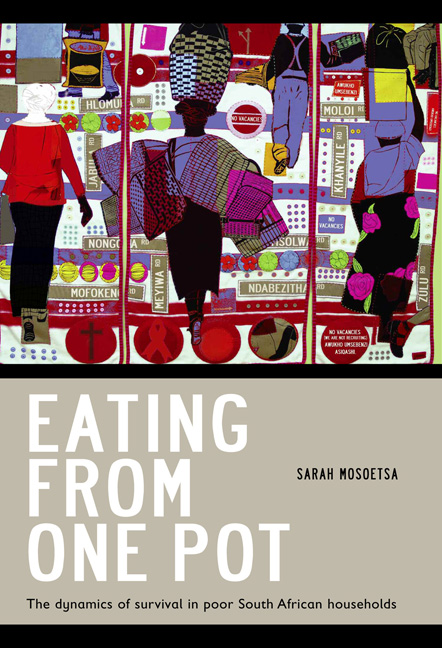Book contents
- Frontmatter
- Contents
- Foreword
- Acknowledgements
- Introduction
- Chapter 1 ‘Sharing the little I have with my family’: the allocative rules of household resources and income
- Chapter 2 ‘My wife does not respect me anymore’: unequal power dynamics in households
- Chapter 3 ‘I remain an ANC member, but …’: civil society in Mpumalanga and Enhlalakahle
- Chapter 4 Theoretical and Policy Implications
- Conclusion: Poor households are fragile sites of stability
- Selected Bibliography
- Index
Foreword
Published online by Cambridge University Press: 20 April 2018
- Frontmatter
- Contents
- Foreword
- Acknowledgements
- Introduction
- Chapter 1 ‘Sharing the little I have with my family’: the allocative rules of household resources and income
- Chapter 2 ‘My wife does not respect me anymore’: unequal power dynamics in households
- Chapter 3 ‘I remain an ANC member, but …’: civil society in Mpumalanga and Enhlalakahle
- Chapter 4 Theoretical and Policy Implications
- Conclusion: Poor households are fragile sites of stability
- Selected Bibliography
- Index
Summary
As I write these words we have just witnessed popular revolts against dictatorships in Tunisia and Egypt, showing how poverty not only breeds passivity but also collective fortitude and resolution. To be sure, these were not “spontaneous” affairs but emerged from years of underground and informal preparation – preparation which included the working class at its center. Similarly, the anti-apartheid struggles involved a long, you might say century-long, preparation, spear-headed by South Africa's black working class, together with such political organizations as the ANC and SACP. While the new South Africa has undoubtedly made many gains, the visions of the Freedom Charter seem to have receded into the past. Indeed, reading Eating from One Pot it is clear that for many postapartheid South Africa has made very little difference in terms of material and social well-being.
Sarah Mosoetsa investigates the fall out of plant closures in the garment and footwear industries of KwaZulu-Natal, South Africa, devastating the sort of communities that had been a center of the anti-apartheid struggle s. Hers was no casual entry, but involved laborious in-depth field work over a period of several years, 2002-2004, immersed in the lives of the people she interviewed. She entered the hidden abode of household production to discover a very different world from the one painted by the merchants of social capital and livelihood strategies. Rather than the romance of poor people struggling together to survive, she found a fractious and often violent world. The household was an ever expanding site – expanding in volume and density – of intense conflicts between generations and between genders. Men, accustomed to wage labour, became ever more dependent on women's resourcefulness, on small informal earning s, subsistence production as well as unpaid domestic labour. As they become increasingly superfluous – surplus labour irrelevant to or even dependent upon the domestic economy – so they become more assertive of their patriarchal claims, more violent, more abusive. If the household contributed to social capital it was as likely to be negative as positive social capital.
- Type
- Chapter
- Information
- Eating from One PotThe dynamics of survival in poor South African households, pp. v - viiPublisher: Wits University PressPrint publication year: 2011



